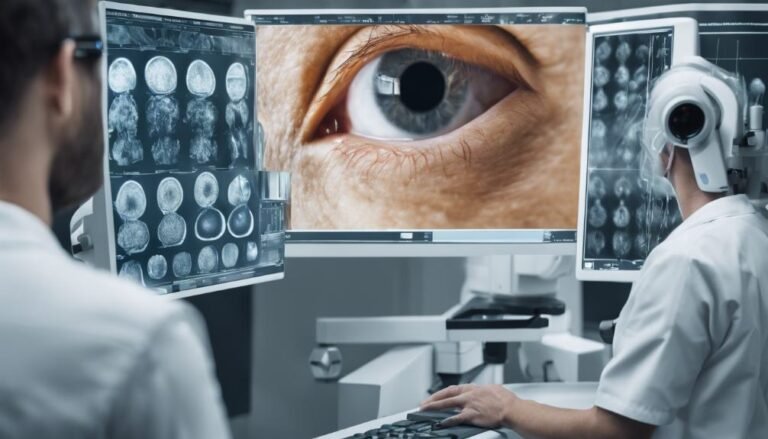AI for Medical Certification Exams
In the domain of medical certification exams, AI is reshaping the landscape with its innovative capabilities. Imagine a world where exam preparation becomes more personalized and effective, where your study resources adapt to your needs seamlessly. Picture a scenario where virtual practice exams not only test your knowledge realistically but also boost your confidence for the real deal. With enhanced security measures and predictive analysis, AI is set to redefine how medical certification exams are approached. The future holds exciting possibilities for AI integration in the medical field, promising a shift towards more efficient and reliable exam processes.
Key Takeaways
- Personalized study pathways and schedules
- Adaptive exam preparation features
- Virtual practice exams for realistic evaluation
- Performance analysis and feedback mechanisms
- Enhanced exam security with biometric authentication
AI-Powered Study Plans
AI-powered study plans revolutionize medical certification exam preparation by offering personalized learning pathways tailored to individual needs and learning styles. Through sophisticated AI tutoring programs, students can access tailored study schedules, practice questions, and resources based on their strengths and weaknesses. This personalized approach enhances efficiency and effectiveness in exam preparation.
Furthermore, AI facilitates study group collaboration, enabling students to engage in peer-to-peer support and knowledge sharing. This interaction fosters a sense of community among learners, promoting a collaborative learning environment.
Additionally, incorporating gamified learning experiences into study plans adds an element of engagement and motivation. By gamifying the learning process, students are incentivized to progress through their study plans and achieve milestones.
Adaptive Exam Prep Tools
Integrating adaptive exam prep tools into your study routine enhances your ability to tailor your preparation according to your progress and performance, ultimately optimizing your exam readiness. These tools utilize algorithms to analyze your strengths and weaknesses, providing personalized study recommendations.
By focusing on areas where you need the most improvement, you can allocate your time and effort more efficiently, leading to a more targeted and effective study plan.
The adaptive nature of these tools guarantees that you're constantly challenged at an appropriate level, promoting continuous learning and growth. This personalized approach not only enhances your exam readiness but also boosts your learning efficiency by honing in on specific areas that require attention.
Virtual Practice Exams
Utilizing virtual practice exams can greatly enhance your exam preparation by simulating the test-taking experience and evaluating your knowledge and readiness in a realistic setting. These remote simulations offer a valuable opportunity to assess your understanding of the material and identify areas that require further study.
By engaging in exam simulations, you can experience the time constraints, question formats, and overall structure of the actual test, helping you build confidence and familiarity with the exam environment.
Virtual training through these exam simulations allows you to gauge your exam readiness and adapt your study approach accordingly. The feedback provided after each practice exam can pinpoint your strengths and weaknesses, enabling you to focus your revision on areas that need improvement.
This targeted preparation can boost your performance on the actual certification exam and increase your chances of success. Embracing virtual practice exams as part of your study routine can lead to a more effective and efficient exam preparation process.
Instant Performance Analytics
Enhancing your exam preparation further, instant performance analytics can provide valuable insights into your strengths and weaknesses, guiding your study focus effectively.
By leveraging performance insights and data visualization, you can gain a thorough understanding of your performance trends. Instant feedback allows you to see where you excel and where you need improvement promptly. This real-time evaluation of your progress can help you adjust your study strategy efficiently.
Data visualization tools can display your performance metrics in a clear and digestible format, making it easier for you to identify patterns and areas that require more attention. Understanding your learning trends through instant performance analytics enables you to focus on enhancing your weaker areas while reinforcing your strengths.
This personalized approach to exam preparation can lead to more targeted and effective study sessions, ultimately improving your readiness for the medical certification exam.
Personalized Feedback Mechanisms
You'll benefit from tailored study recommendations, real-time progress tracking, and adaptive question selection when utilizing personalized feedback mechanisms in AI-powered medical certification exams.
These features will help you focus on areas that require improvement, monitor your advancement throughout the preparation process, and engage with questions that match your competency level.
Ultimately, this personalized approach can enhance your overall exam readiness and performance.
Tailored Study Recommendations
Tailored study recommendations are essential in optimizing the learning experience and performance outcomes for individuals preparing for medical certification exams. By utilizing study habit analysis and AI tutors, personalized feedback mechanisms can provide tailored study recommendations based on an individual's unique learning style. Through the integration of learning style assessment tools and smart study guides, AI systems can identify strengths and weaknesses, allowing for a more efficient and effective study plan.
Study habit analysis enables AI tutors to track how individuals engage with study materials, identifying patterns that can be used to generate personalized study recommendations. These recommendations may include specific topics to focus on, study strategies to employ, and even suggested study schedules tailored to the individual's learning preferences.
With the help of AI-driven learning style assessment and smart study guides, individuals can receive targeted guidance that caters to their specific needs, ultimately enhancing their preparation for medical certification exams. By leveraging these tailored study recommendations, candidates can optimize their study efforts and improve their overall exam performance.
Real-Time Progress Tracking
How can real-time progress tracking through personalized feedback mechanisms benefit individuals preparing for medical certification exams?
Real-time progress updates provide valuable insights into your performance, allowing you to track your advancements and areas needing improvement. By receiving personalized study plans based on your performance tracking, you can focus your efforts more effectively, optimizing your study time and enhancing your exam readiness.
Performance tracking enables you to identify patterns in your learning, highlighting strengths and weaknesses. This information can be used to tailor your study approach, ensuring you concentrate on areas that require more attention. Adaptive learning strategies can then be implemented, adjusting the study material and techniques to suit your individual needs.
Through real-time progress tracking and personalized feedback mechanisms, you can enhance your study experience, increase retention of information, and boost your overall exam performance.
Adaptive Question Selection
Utilizing adaptive question selection within personalized feedback mechanisms enhances exam preparation by dynamically adjusting the difficulty of questions based on individual performance. This adaptive learning approach guarantees that candidates are presented with questions that match their current skill level, thereby optimizing their study experience and improving overall exam readiness. By tailoring the question difficulty to the individual's capabilities, the adaptive system helps maintain a challenging yet manageable learning curve, keeping users engaged and motivated throughout their exam preparation journey.
Moreover, personalized feedback mechanisms play an essential role in this process by providing insightful performance feedback to candidates. This feedback not only informs test-takers about their strengths and weaknesses but also offers specific guidance on areas that require improvement. By receiving targeted feedback based on their performance, candidates can focus their study efforts more effectively, leading to a more efficient and productive exam preparation experience.
Ultimately, the integration of adaptive question selection and personalized feedback mechanisms enhances the learning process, increases engagement, and boosts exam readiness for medical certification candidates.
Enhanced Exam Security Measures
To strengthen exam security measures, implementing advanced biometric authentication protocols is crucial in guaranteeing the integrity of medical certification exams. Biometric verification, such as fingerprint or facial recognition technology, adds an extra layer of security by verifying the identity of the test-taker. This prevents unauthorized individuals from taking the exam on behalf of someone else.
In addition to biometric verification, remote monitoring can further enhance exam security. Through the use of AI-powered proctoring tools, exam administrators can remotely monitor test-takers in real-time. These tools can detect suspicious behavior, such as looking away from the screen frequently or attempting to use unauthorized materials.
Predictive Exam Outcome Analysis
Implementing predictive exam outcome analysis provides valuable insights into test-takers' performance trends and helps identify areas for improvement in medical certification exams. By utilizing data analysis techniques and predictive modeling, exam outcome prediction becomes more accurate and reliable.
Through the analysis of historical exam data, patterns and trends in test-taker performance can be identified, allowing for a deeper understanding of the factors influencing exam outcomes. Predictive modeling enables exam administrators to anticipate potential challenges faced by test-takers, thereby facilitating targeted interventions to support those in need.
By identifying areas where test-takers commonly struggle, exam content and format adjustments can be made to better align with the knowledge and skills being assessed. This proactive approach to exam outcome analysis not only enhances the overall quality of medical certification exams but also contributes to the continuous improvement of assessment processes.
AI-Assisted Exam Proctoring
Exam monitoring technology has revolutionized the way certification exams are administered, providing a more secure and efficient process.
AI-assisted proctoring guarantees the accuracy and fairness of exams by analyzing proctoring data.
Exam Monitoring Technology
With the advancements in technology, the integration of AI-assisted exam proctoring has revolutionized the monitoring process for medical certification exams. Remote monitoring, a key feature of this technology, allows for exams to be overseen from a distance, ensuring a secure testing environment for all participants.
Through the use of AI algorithms, proctoring systems can detect suspicious behaviors such as eye movements, background noise, and multiple faces in the camera frame, enhancing cheating prevention measures.
This technology not only offers a proactive approach to monitoring exams but also provides real-time intervention in case of any irregularities. By flagging unusual activities during the exam, such as looking away from the screen for an extended period or attempting to access unauthorized resources, AI-assisted proctoring systems contribute significantly to maintaining the integrity of medical certification exams.
Proctoring Accuracy Analysis
The effectiveness of AI-assisted exam proctoring in maintaining the integrity of medical certification exams can be evaluated through a thorough analysis of proctoring accuracy. Proctoring accuracy refers to the precision and reliability of monitoring technology in detecting and flagging potential instances of cheating or misconduct during exams.
By scrutinizing the accuracy of AI algorithms in identifying suspicious behaviors, such as unauthorized use of study materials or external assistance, the efficacy of proctoring systems can be assessed.
Monitoring technology plays an essential role in ensuring that medical certification exams uphold stringent standards of fairness and authenticity. The analysis of proctoring accuracy involves examining the ability of AI systems to accurately differentiate between permissible and impermissible behaviors, thereby safeguarding the credibility of exam results.
Through continuous refinement and validation of proctoring accuracy, exam administrators can enhance the trustworthiness of certification processes and deter fraudulent activities. Ultimately, a meticulous evaluation of proctoring accuracy is vital for optimizing the overall effectiveness of AI-assisted exam proctoring in the medical field.
Future Trends in AI Integration
Incorporating more advanced machine learning algorithms is essential for the continuous improvement of AI integration in medical certification exams. As AI technology progresses, future trends will likely focus on addressing ethical implications and data privacy concerns.
Ensuring that AI systems uphold ethical standards and protect sensitive data is paramount in the development of certification exams. Implementation challenges such as integrating AI seamlessly into exam platforms and ensuring compatibility with existing systems will need to be overcome. Additionally, meeting the training requirements for AI algorithms to accurately assess medical knowledge and skills poses another significant challenge.
Looking ahead, advancements in AI integration may involve enhancing the adaptability of algorithms to accommodate diverse exam formats and question types. Furthermore, refining AI capabilities to provide personalized feedback to candidates based on their performance could further improve the effectiveness of medical certification exams.
Conclusion
As you navigate the vast ocean of medical certification exams, AI-powered study tools serve as your trusty compass, guiding you towards success.
With personalized learning pathways, adaptive exam prep tools, and virtual practice exams, you can chart your course with confidence.
Instant performance analytics and personalized feedback act as your navigator, directing you towards improvement.
Enhanced exam security measures guarantee a fair and secure journey.
Embrace the future trends in AI integration as your ship sails towards certification success.







